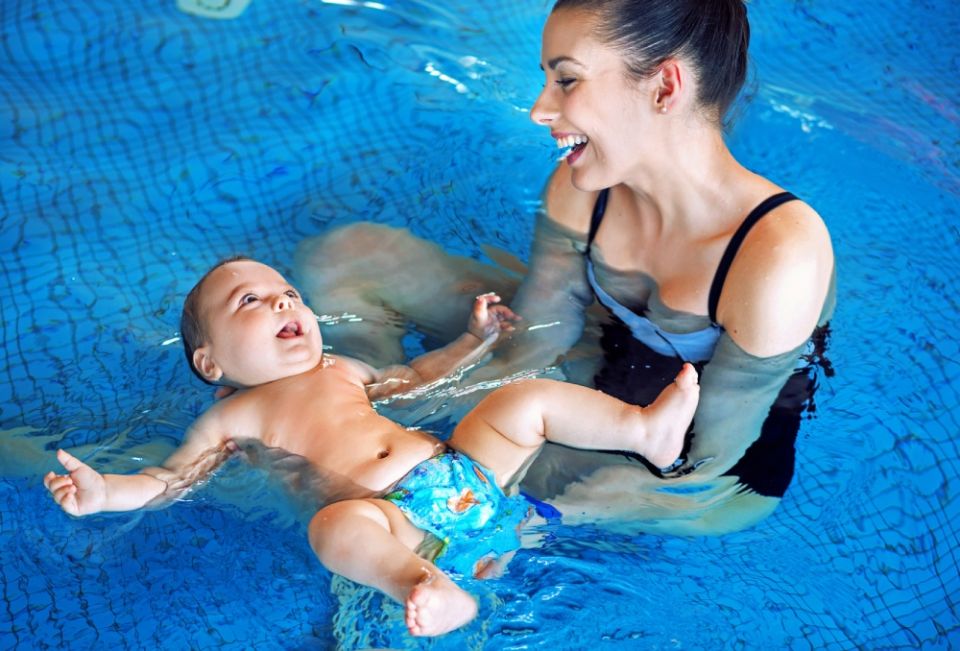A Parent’s Guide on Swimming Lessons for Babies and Infants
10/12/2019 | Written by Nikos Vasilellis in Babies & Toddlers
Probably one of the major issues of debate, regarding the swimming courses, is the one about the appropriate age of beginning such courses. Indeed, parents who are not familiar with the great advantages of early swimming lessons could be reluctant to enrol their babies and infants in swimming classes.
However, evidence suggests that learning to swim from a very young age can have extremely beneficial results not only for their safety but also for their physical, mental and psychological development.
Early Swimming Classes Have Always a Positive Impact on Baby's Development
A quite striking and not so well-known fact is that newborn babies possess two reflexes: The diving reflex and the swimming reflex. The first reflex refers to the natural reaction of a baby to hold its breath when being underwater, while the latter refers to its instinctive reaction of moving its arms and legs within a water environment. Both of those reflexes vanish gradually after the age of six months. Of course, this does not mean that babies before that age can start swimming lessons.
Actually, the best way to familiarise toddlers with water is in the safe environment of the bathtub. In a way, it is a paradox that there is a consensus that babies can start practising swim lessons at the age of six months, exactly when the two aforementioned reflexes begin to fade and disappear. On the other hand, the diving and swimming reflexes could be seen as indicators of existing traits that can be further developed.
Advantages of Swimming Classes for Babies and Infants in Australia
Living in Australia is full of advantages, but some dangers can't be overlooked. The Royal Life Saving National Drowning Report in 2017 shows that drowning of children under five years old increased by 32 % the year before. Such figures give a justified reason for concern among parents across the country.
The safety issue is of major importance. Again, research has shown that early swimming classes are pivotal for the safety of kids: According to a case-controlled study, conducted in the USA in 2009, participation in swimming lessons can reduce a child's risk of drowning by 88% in ages between one to four years old.
Another study has shown that children aged from two months to four years old gain more self-confidence and independence, when participating in swim classes, compared to the children who did not participate in such classes.
Furthermore, swimming classes for babies in Australia help in muscle building and brain development, improve the strength of their hearts and lungs and play a crucial role in the formation of a healthy body. Moreover, apart from the obvious physical advantages, early swimming classes result in the building of stronger bonds among family members who share time in the swimming pool.
Swimming Age Categories for Babies and Infants
Babies can start attending swimming classes at the age of six months. The swim courses are adjusted to this sensitive period, until the age of three years, when they are pre-school children. In general terms, there are three age categories for the swimming courses taught to babies:
- Swimming lessons for babies aged from 6 to 14 months old
- Swimming lessons for babies aged from 15 to 24 months old
- Swimming lessons for babies aged from 25 to 36 months old
Babies who follow the whole swimming lesson plan will reach the age of three years is at least totally familiar with water, able to hold their heads above water and performing many basic swimming techniques.
Necessary Swimming Equipment for Babies
When coming to the swimming pool with your kids, you will need to bring with you some necessary equipment. The essential things are the following:
- A long towel to cover the children with, after the swim class
- A swim nappy
- Toys or/and books to keep them occupied
- Some light snack as swimming increases the appetite
- Warm clothes to use again after the end of the swim course
- Alternatively, you could use a full swimsuit if you wish to provide your kid(s) with more warmth
Safety instructions During Babies' Swimming Lessons
When speaking about swimming and babies, safety always comes first. So here are some useful tips for parents who have a pool at their houses and are new to this process:
- Always keep an eye on the children and never leave them alone
- Make sure that the temperature of the swimming pool is between 31.5 and 33°C
- Be certain that all necessary medical examination has been conducted. The doctor of the children must have confirmed that the chlorine of the swimming pool would not be irritating for their skin
- Never leave any toys in the pool, as it may be a temptation for kids to try and reach them
- Keep the pool safely fenced so the kids will never be able to reach it unattended
- Do not keep electrical appliances near the poll